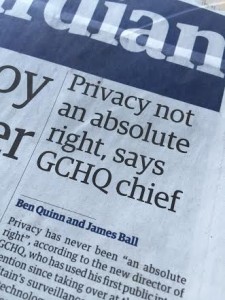This morning’s Observer column:
A headline caught my eye last Tuesday morning. “Privacy not an absolute right, says GCHQ chief”, it read. Given that GCHQ bosses are normally sensibly taciturn types, it looked puzzling. But it turns out that Sir Iain Lobban has retired from GCHQ to spend more time with his pension, to be followed no doubt, after a discreet interval, with some lucrative non-exec directorships. His successor is a Foreign Office smoothie, name of Robert Hannigan, who obviously decided that the best form of defence against the Snowden revelations is attack, which he mounted via an op-ed piece in the Financial Times, in the course of which he wrote some very puzzling things…
LATER The Economist has a curiously wishy-washy piece about this. It recalls the row, many years ago, about the Clipper chip and points out that it isn’t just the GCHQ boss who is critical of the companies. Michael Roberts, the new NSA director, last week said much the same thing to an audience in Silicon Valley. As to what will happen, though, the Economist is uncharacteristially uncertain:
Although the shrill rhetoric on both sides suggests the opposite, it seems mostly a negotiating tactic. Mr Rogers’s speech in Silicon Valley was essentially an offer to talk. “I’m not one who jumps up and down and says either side is fundamentally wrong,” he said. “We have no choice but to come to an agreement,” says the boss of an American technology giant. A deal would be welcome, but only if the rules are transparent, enforceable—and apply not just to American agencies, but to the other members of the “Five Eyes”, the intelligence alliance which also includes Australia, Britain, Canada and New Zealand.
Will it happen? More likely, there will be muddling through—just like after the Clipper chip. Technology companies will negotiate some arrangement to satisfy information requests by governments. And intelligence services will try to exploit vulnerabilities in encryption technologies or create backdoors surreptitiously. Until, perhaps, another Snowden comes along.

